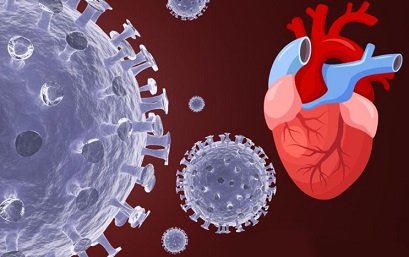BREAKING COVID-19 News! SARS-CoV-2 Cardiovascular Complications Are Due To Generated Autoantibodies Targeting G-Protein-Coupled Receptors!
Nikhil Prasad Fact checked by:Thailand Medical News Team Sep 29, 2023 1 year, 6 months, 2 weeks, 7 hours, 49 minutes ago
German Study Involving Animal Models Finds That SARS-CoV-2 Infections Lead To Generation Of Functional Autoantibodies That Target G-Protein-Coupled Receptors, Causing A Variety Of Cardiovascular Complications!
COVID-19 News: The global impact of Coronavirus Disease 2019 (COVID-19), caused by the severe acute respiratory syndrome coronavirus 2 (SARS-CoV-2), has been profound, affecting healthcare systems and individuals worldwide. While the primary symptoms of this infection are well-documented in various studies and
COVID-19 News reports, and typically include fever, dyspnea, cough, myalgia, and fatigue, a subset of patients experiences a prolonged and debilitating form of the disease known as long-COVID. Long-COVID manifests with persistent symptoms such as chronic fatigue, dyspnea, chest and muscle pain, and neurological disorders, including brain fog, altered smell and taste, and headaches. A variety of heart and cardiovascular issues including some with fatal outcomes have also been seen in COVID-19 infected and post-COVID individuals. However, the mechanisms underlying the development of these distinct long-COVID symptoms and also cardiovascular issues and particularly the role of autoantibodies, remain poorly understood.

Recent evidence has suggested that autoimmune processes may contribute to the diverse and lingering symptoms observed in long-COVID patients. Studies have shown that individuals with long-COVID harbor autoantibodies (AAB) directed against various targets, including extracellular antigens, immunomodulatory proteins like cytokines and chemokines, and G-protein-coupled receptors (GPCRs). These autoantibodies are not mere bystanders but possess functional properties, akin to natural agonists, capable of triggering receptor responses.
Importantly, these functional autoantibodies (fAABs) can disrupt normal physiological processes by inducing permanent receptor stimulation, potentially leading to hormonal imbalances and contributing to the array of symptoms seen in long-COVID patients.
Until now, it has remained unclear whether the production of fAABs is a direct consequence of SARS-CoV-2 infection. To address this crucial question, researchers embarked on a study using animal models, namely cattle and ferrets, which exhibit varying susceptibilities to SARS-CoV-2. This investigation aimed to determine whether experimental SARS-CoV-2 infection in these animals would result in the generation of fAABs targeting GPCRs, shedding light on potential mechanisms underlying long-COVID and its cardiovascular complications.
Functional Autoantibodies Target G-Protein-Coupled Receptors
G-protein-coupled receptors (GPCRs), also known as seven-transmembrane domain receptors, play pivotal roles in cellular responses by detecting molecules outside the cell and initiating intracellular signaling cascades. In the cardiovascular system, GPCRs are widely expressed and regulate critical functions and morphological aspects. Notable GPCRs in cardiovascular function include β-adrenergic receptors (βARs) and angiotensin II type 1 receptors (AT1Rs).
In this groundbreaking study conducted by Berlin Cures GmbH-Ger
many, Friedrich-Loeffler-Institut-Germany, and Berlin Heals-Germany, researchers sought to investigate the presence and activity of fAABs targeting GPCRs in animal models experimentally infected with SARS-CoV-2.
Experimental Findings
The study involved cattle and ferrets; two animal models chosen for their differing susceptibility to SARS-CoV-2. Among the cattle experimentally inoculated with the virus, only two out of six showed viral replication and tested positive for fAABs targeting GPCRs.
These fAABs specifically recognized β2-adrenoceptor, angiotensin II AT1 receptor, muscarinic M2 receptor, and angiotensin 1-7 MAS receptor. Intriguingly, they induced distinct positive and negative chronotropic effects, influencing heart rate.
Similarly, ferrets infected with SARS-CoV-2 generated fAABs against β2-adrenoceptor and muscarinic M2 receptor, displaying bioactivity similar to that observed in cattle. This remarkable finding suggests that fAABs targeting GPCRs can be generated in response to SARS-CoV-2 infection, potentially providing a mechanistic link to the cardiovascular complications observed in COVID-19 patients.
Discussion and Implications
The results of this study raise several important questions and implications:
The Role of fAABs in Long-COVID: The presence of fAABs targeting GPCRs in both cattle and ferrets post-SARS-CoV-2 infection underscores their potential relevance in the development and persistence of long-COVID symptoms, including cardiovascular complications. Further research is warranted to explore the role of these autoantibodies in humans with long-COVID.
Mechanisms Behind fAAB Generation: It remains unclear how SARS-CoV-2 infection triggers the production of fAABs. Two possible explanations are structural similarities between viral components and host GPCR receptors and the inflammatory response induced by the virus. A deeper understanding of these mechanisms could provide insights into therapeutic interventions.
Therapeutic Potential: The study hints at a potential therapeutic avenue for long-COVID patients. In a separate case report, the aptamer BC007 demonstrated in vitro neutralization of fAABs in cattle and ferrets, leading to symptom improvement in long-COVID patients. Investigating the therapeutic potential of BC007 and similar approaches in a clinical setting is an exciting prospect.
Animal Models for COVID-19 Research: The differential susceptibility of cattle and ferrets to SARS-CoV-2 infection highlights the complexity of animal models in COVID-19 research. Understanding the factors influencing susceptibility in various species is crucial for translating findings to human relevance.
Conclusion
In summary, the groundbreaking research presented in this study reveals that experimental SARS-CoV-2 infection in cattle and ferrets can lead to the formation of functional autoantibodies targeting GPCRs. These autoantibodies, capable of influencing heart rate and potentially disrupting cardiovascular function, may shed light on the mechanisms underlying long-COVID and its associated symptoms.
The study's findings underscore the importance of further research into the role of autoantibodies in long-COVID, the mechanisms of fAAB generation, and the potential therapeutic interventions. This knowledge could not only advance our understanding of long-COVID but also offer hope for individuals grappling with its persistent and debilitating symptoms. Ultimately, unraveling the mysteries of long-COVID may pave the way for improved treatments and a brighter future for affected individuals.
The study findings were published in the peer reviewed journal: Biomedicines
https://www.mdpi.com/2227-9059/11/10/2668
For the latest
COVID-19 News, keep on logging to Thailand Medical News.
